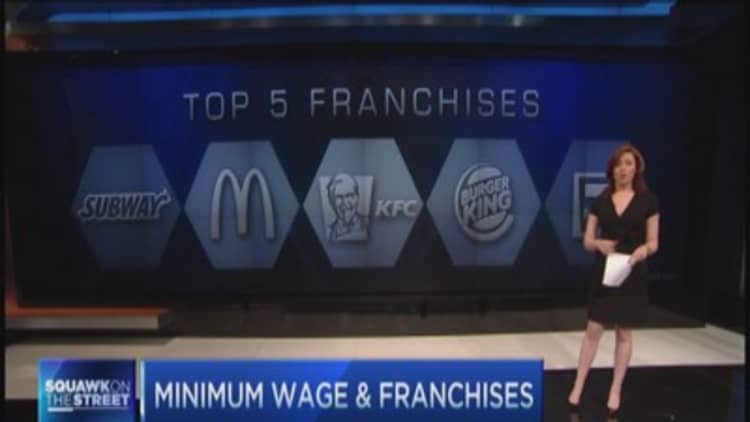
Hourly wage workers around the country are cheering hikes in their pay this new year, with 21 states raising the wage in 2015 after moves by state legislatures and voter approval during midterm elections. Some of the pay increases in the new year also reflect annual cost of living increases by individual states.
Individual franchises of big corporations, and independent chain operators are among the first to feel the effects of wage hikes.
"It concerns me when voters enact these things—everyone wants to have more pay in wages, but don't like to pay more for the goods and services they use every day," said Don Davey of Firehouse Subs. He operates franchises in Florida and Wisconsin.
Davey's Florida businesses will be impacted by higher cost of living increases, effective New Year's Day. His 200 workers in 13 Florida locations will see the minimum wage rise to $8.05 an hour in 2015, compared with $7.93 in 2014. However, many of his workers start above the state's minimum wage.
"Over time, this will lead to 5, 10 or 15 percent increase in price for consumers," Davey said.
Read MoreHow feel-good companies are navigating the minimum-wage fray
The International Franchise Association says franchises in the impacted 21 states will be affected in some way by wage hikes, and many of its group members believe the higher wages will have negative ramifications.
More than 85 percent of members believe "recent efforts by some cities and states to increase the minimum wage will negatively impact their business," said an association spokesperson, in an email to CNBC.
What's next for the wage fight in 2015?
As of Jan. 1, 29 states and Washington, D.C., will boast minimum wages above the federal level of $7.25 an hour, according to the National Conference of State Legislatures.
The minimum wage fight, meanwhile, is expected to continue into the new year. Fast food chain workers have been part of an effort to raise the national minimum wage to $15 an hour.
More action on wage increases is expected in states and cities, and the new Congress will likely take up the issue in 2015, says Holly Sklar, chief executive of Business for a Fair Minimum Wage, a national advocacy group. "State legislative or ballot initiative campaigns are currently underway or being explored in California, Colorado, Illinois, Maine, Missouri, Oregon, Pennsylvania and New York," Sklar said.
And voter approval for higher wages in red states during the midterms suggests there's some appetite for pay increases beyond traditional, liberal regions.
Read MoreFour red states to consider higher minimum wages
Four red states—Alaska, Arkansas, Nebraska and South Dakota—all voted to raise minimum wages in 2014 on state measures, notes Christian Weller, senior fellow at the Center for American Progress.
"Starting Jan. 1, we will have about 29 states above the federal minimum wage, which affects about 60 percent of the American workforce," Weller said. "That creates a certain momentum."
Big-name franchises, meanwhile, have been mostly quiet on the wage battle. Dunkin' Donuts tells CNBC in an email that "the majority of our franchisees pay above the minimum wage, and we believe state and local governments are the right forum to have a conversation about minimum wage increases."
Advocates for higher wages disagree. "State action is important, but a federal increase is still essential in raising the national floor. Millions of Americans live in states with little or no chance of going above the federal rate," said Sklar of Business for a Fair Minimum Wage.
States seeing higher wages in the new year
The states seeing hikes on Jan. 1 are Arkansas, Connecticut, Hawaii, Maryland, Massachusetts, Nebraska, Rhode Island, South Dakota, Vermont and West Virginia. New York's increase took effect Wednesday.
Nine additional states will see an increase on Jan. 1 thanks to cost of living increases. Those states are Arizona, Colorado, Florida, Missouri, Montana, New Jersey, Ohio, Oregon and Washington state.
Alaska also approved a ballot measure during midterms that called for a Jan. 1 hike, but that increase will not take place until Feb. 24.


